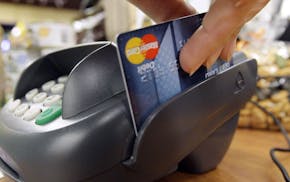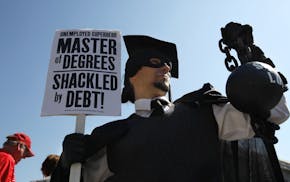As is so often the case with hookups, the one between a mild-mannered, well meaning community banker from St. Paul and the Kardashian siblings probably never had a chance.
The banker, David Reiling, is acclaimed for deploying assets in service to low-income neighborhoods. His shortlived business partners, the Kardashian sisters, have leveraged their individual assets into a televised celebration of conspicuous consumption.
Reiling insists he's not "a starlet kind of guy." He and his colleagues at Sunrise Community Banks deliberated long and hard before deciding that their University Bank would issue the Kardashian Kard, a prepaid, reloadable debit card featuring the images of Kim, Khloe and Kourtney Kardashian.
Consumer advocates pounced, citing the high and numerous fees one would incur by trying to keep up with the Kardashians. Slate dubbed it "possibly America's dumbest financial product." Connecticut's state attorney general threatened to sue, alleging exorbitant and hidden fees.
"This was one of the worst financial products ever introduced," Bill Hardekopf, CEO of LowCards.com and author of "The Credit Card Guidebook," said Tuesday.
That stings, Reiling said, in part because he doesn't think it's true. "We did a fee analysis and compared it to others out there and it was in the middle to low end," he said. "The fees are fully disclosed. We even provided people with information about how they could minimize their fees."
The Reiling family bought University Bank, which is a few blocks from the State Capitol in St. Paul's Frogtown neighborhood, in 1997. At the time, there were five check-cashing outlets within a few blocks of the bank, and Reiling said he was struck by how many neighborhood residents chose to use them instead of the bank.
So Reiling bought one of the check cashing outlets and moved it into the bank's lobby. He lowered all the fees and met individually with hundreds of customers to try to understand why they avoided using banks. He persuaded some of them to open accounts, but many were resistant.
An estimated 60 million adults in the United States lack a bank account or make limited use of bank services, according to the Federal Deposit Insurance Corp. While the majority of the unbanked and underbanked have household income under $30,000, they are not necessarily poor. Some avoid banks because they've been stung by overdraft fees or are unable to meet minimum balance requirements. Some don't have access to credit cards or bank debit cards because they lack a credit history.
The prepaid, reloadable debit card was developed with these consumers in mind, and business is booming. Mercator Advisory Group estimates that $118.4 billion will be loaded on general purpose, pre-paid debit cards in 2012, up from $18.3 billion in 2009. MetaBank, based in tiny Storm Lake, Iowa, has become a financial titan as bank and payment processor behind many of these cards.
Green Dot Corp. and NetSpend Corp., two issuers of prepaid debit cards, raised a combined $368 million in initial stock offerings earlier this year. In addition to selling the cards directly to consumers on the Web, these companies also rely on a variety of retail partners and employers to market them. NetSpend's cards, for example, are made available to employees at Kohl's and Macy's.
Some of these cards are just another high-tech way to gouge the poor or uninformed. But some cards do offer dramatically lower fees than consumers would encounter at check cashing outlets and payday lenders. At least one, AccountNow, helps consumers build a credit score, with the ultimate goal of moving them to the financial mainstream.
Sunrise issued its first prepaid cards about a decade ago and currently has about 190,000 active cards, half of them going to unbanked consumers. To keep the program going, Reiling was looking for new, low-cost ways to add accounts. That's when the Kardashians came calling.
"Obviously, they have a certain brand and we have a certain brand," Reiling said. "But is pop culture and reality TV really bad? Our parents thought the same thing about the Beatles."
Reiling met the Kardashians in New York City. "They seemed very nice," he said.
From the monthly fee of $7.95, Sunrise stood to collect between 95 cents and $1 per card. The rest would have been split between the electronic processor, Visa and MasterCard, and the Kardashians. The $9.95 fee for issuing the card would have been eaten up by the cost of the plastic and the setting up of the accounts, Reiling said.
But it was the other fees that upset consumer groups: $1.50 for ATM withdrawals in addition to ATM fees; $2 per item for automatic bill pay; $1 for adding money to the card; $6 to close the account.
Those fees may not be out of the norm for prepaid cards, but Kardashian Kard was marketed to consumers who generally have less-expensive options.
Only 250 people signed up for the card, and Sunrise, fearing long-term damage to its credibility and image, informed the Kardashians last week that it wanted out.
Hollywood divorces are never pleasant. The Kardashians waited until Monday to issue a press release that suggested they, too, were shocked by the fees.
"Yeah, they pretty much threw us under the bus," Reiling said.
ericw@startribune.com • 612-673-1736

Wieffering: Time to get over debit card fees
For Thrivent and others, warnings were there

With billions in sales, some co-ops are big business

